 Rossellini: The War Trilogy ( 3-blu-ray disc set) | Blu Ray | (07/08/2017)
from £26.98
| Saving you £N/A (N/A%)
| RRP
Rossellini: The War Trilogy ( 3-blu-ray disc set) | Blu Ray | (07/08/2017)
from £26.98
| Saving you £N/A (N/A%)
| RRP ROSSELLINI: THE WAR TRILOGY (3-Blu-ray Disc Set) Films by Roberto Rossellini Rossellini's celebrated trilogy, made during and immediately after the Second World War, is available for the first time on Blu-ray in the UK in this 3-disc box set. Rome, Open City, Paisa, and Germany Year Zero provide heart-rending depictions of a Europe savaged by war, the struggles faced by ordinary people and the hope that endures, establishing Roberto Rossellini as one of the most important and influential filmmakers of all time. Rome, Open City Italy | 1945 | 1.33:1 | black and white | 103 minutes Paisà Italy | 1946 | 1.33:1 | black and white | 125 minutes Germany Year Zero Germany, Italy | 1948 | 1.33:1 | black and white | 73 minutes Special Features Newly remastered presentations L'amore (Roberto Rossellini, 1948, 80 mins): Rossellini's controversial two-part anthology film showcasing the maniford talents of Anna Magnani. The first part, A Human Voice, is written by Jean Cocteau, and the second, The Miracle, is written by Federico Fellini Children of the Open City (Laura Muscardin, 2005, 53 mins): documentary featuring Vito Annicchiarico visiting key locations from Rome, Open City and sharing memories of the shoot Into the Future (Tag Gallagher, 2009, 32 mins): visual essay on the War Trilogy by film scholar Tag Gallagher Fully illustrated booklet featuring writings by Tag Gallagher, Geoffrey Nowell-Smith and Jonathan Rosenbaum, and full film credits Italian, German and English language, with optional English subtitles | BD50 x 3 | 1080p | 24fps | PCM mono audio (48k/24-bit) | Cert 12 (moderate violence) | Region B Blu-ray
![Rome, Open City [DVD]](/pictures/1135488.jpg) Rome, Open City | DVD | (30/03/2015)
from £18.75
| Saving you £1.24 (6.61%)
| RRP
Rome, Open City | DVD | (30/03/2015)
from £18.75
| Saving you £1.24 (6.61%)
| RRP A landmark of Italian neorealism and often cited as one of the greatest films ever made Roberto Rossellini’s portrait of life under the Nazi occupation remains remarkable for its sheer immediacy tension and power. Rome Open City tells the story of an Italian partisan Francesco (Marcello Pagliero) his fiance Pina (Anna Magnani) one of the heads of the Italian resistance Manfredi and a Catholic priest Don Pietro (Aldo Fabrizi). The groundbreaking film is the first part of Rossellini’s celebrated War trilogy (followed by Paisà and Germany Year Zero). Features: Remastered presentation
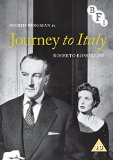 Journey to Italy (DVD) | DVD | (20/07/2015)
from £10.27
| Saving you £11.48 (134.90%)
| RRP
Journey to Italy (DVD) | DVD | (20/07/2015)
from £10.27
| Saving you £11.48 (134.90%)
| RRP A well-to-do married English couple travel to Naples after inheriting a villa Alex (George Sanders) a workaholic businessman and Katherine (Ingrid Bergman) a more sensitive character. With a loveless relationship the couple are on the verge of a divorce and decide to spend the remainder of their trip separately. Katherine visits museums and historical sites while Alexander goes to Capri to relax with drinks. Their separation allows them to grow and revisit the past and ultimately begin to become intrigued again with one another a delayed anti-honeymoon. Poorly received on initial release the film feels eerily modern due to its timeless themes of the unwelcome intrusion of the past and the terrifying uncertainty of the future both reccurring in Rossellini's work. Ranked 39 in the Sight and Sound's 'Top 50 Greatest Films of all Time' the film has recently received the recognition it deserves with Martin Scorsese even making his own film My Voyage to Italy exploring Italian cinema in general and the film's impact on his work
 Stromboli, Land of God (DVD) | DVD | (20/07/2015)
from £18.75
| Saving you £1.24 (6.61%)
| RRP
Stromboli, Land of God (DVD) | DVD | (20/07/2015)
from £18.75
| Saving you £1.24 (6.61%)
| RRP Stromboli Land of God follows Karen (Ingrid Bergman) a young woman from Lithuania who marries fisherman Antonio (Mario Vitale) to escape from a prison camp after being promised a great life on his home island of Stromboli. Karen soon discovers the island is harsh and barren with the locals acting in a hostile manner towards this strange foreign woman Karen increasingly becomes despondent looking for ways to escape this new life. This Italian neorealist classic is famously the result of a letter from Bergman to Rossellini in which she spoke of her admiration for his work and how she wanted to make a film with him. The letter also sparked the infamous affair between Rossellini and Bergman which began during the production of the film. This digitally remastered edition also contains Francesco Patierno’s 2012 documentary The War of the Volcanoes which explores through the use of rich archive footage the intense and dramatic love story which took place during the production of Stromboli Land of God.
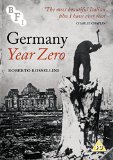 Germany Year Zero (DVD) | DVD | (30/03/2015)
from £9.15
| Saving you £10.84 (118.47%)
| RRP
Germany Year Zero (DVD) | DVD | (30/03/2015)
from £9.15
| Saving you £10.84 (118.47%)
| RRP Newly restored version of Roberto Rossellini’s closing part of his celebrated War Trilogy. Amidst the ruins of Berlin in the immediate post-war years a young boy Edmund attempts to support his family. This devastating portrait of an obliterated post-war Europe remains one of the most affecting films in the history of cinema. This new DVD edition also includes L’Amore (1948) Rossellini’s two-part anthology film which proved hugely controversial on its original release. The first part was co-scripted by Rossellini and Federico Fellini and stars Fellini as Saint Joseph who villainously impregnates Nanni (Anna Magnani) a disturbed peasant who believes herself to be the Virgin Mary. The second part is based on Jean Cocteau’s play La voix humaine. Features: Newly restored presentations of Germany Year Zero and L’Amore L’Amore (Roberto Rossellini 1948 70 mins): anthology film with sections written by Jean Cocteau and Federico Fellini and starring Anna Magnani Illustrated booklet with film notes and complete credits
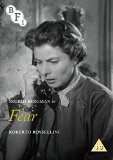 Fear (DVD) | DVD | (20/07/2015)
from £9.15
| Saving you £10.84 (118.47%)
| RRP
Fear (DVD) | DVD | (20/07/2015)
from £9.15
| Saving you £10.84 (118.47%)
| RRP Filmed in Munich Fear finds Rossellini returning to the territory of Germany Year Zero a decade later examining a nation in recovery and still suffering major psychological scars. But where the earlier film was framed in the neo-realist mode Rossellini had started to produce more traditional genre narratives in this case noir. Bergman stars as Irene Wagner a married woman carrying on an affair with Erich (Kurt Kreuger). However Erich's sadistic former flame Luisa (Renate Mannhardt) finds out Irene's secret and proceeds to blackmail her turning the woman's life into an escalating nightmare eventually posing a threat to both herself and those around her.
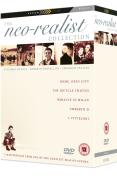 Neo-Realist Box Set | DVD | (25/09/2006)
from £33.23
| Saving you £1.76 (5.30%)
| RRP
Neo-Realist Box Set | DVD | (25/09/2006)
from £33.23
| Saving you £1.76 (5.30%)
| RRP Rome Open City: Roberto Rossellini's startling depiction of Nazi-occupied World War II Rome and one of the most prominent examples of his neorealist cinematic style is the story of a tenaciously held underground resistance against the Germans. When its leader Manfredi (Marcello Pagliero) and a priest Don Pietro (Aldo Fabrizi) are captured the resistance collapses with disastrous personal results to all. The film was nominated for an Oscar for Best Screenplay; Fellini collaborated with Rossellini in the writing of the script. 'Open City' is all the more remarkable in that it was made immediately following the liberation of Rome had been developed while Rossellini himself was in hiding and was filmed in the locations where the true events that the story are based on occurred. (Dir. Roberto Rossellini 1945) The Bicycle Thieves: After nearly two years of unemployment Antonio (Lamberto Maggiorani) finally finds work posting bills. But he needs a bicycle to do the job. Unfortunately he was forced to pawn his own bicycle long ago. In a humbling tragic scene Antonio exchanges his family's linen for his bicycle. But when the bike is stolen on his first day of work he must comb the streets of Rome in search of the bike: his family's only means to survival. Shot on location in Rome and using non-actors as a means of heightening the reality of the film Ladri Di Biciclette received the Honorary Award for Best Foreign Film at the 1950 Oscars. (Dir. Vittorio De Sica 1948) Miracle In Milan: Once upon a time an old woman discovered a young child in her cabbage patch. She cared for him until her death at which time the boy was placed into an orphanage. When the child is released from the orphanage he inspires shantytown squatters to improve their huts and enjoy the world. But as they begin to rebuild the squatters strike oil. The landowner evicts them wanting the oil for himself. But the old woman drops down from heaven to give Toto a magical dove which grants them whatever wish they want. Winner of the Grand Prize at the 1951 Cannes Film Festival - tied with Frken Julie. (Dir. Vittorio De Sica 1951) Umberto D: Retired civil servant Umberto struggles to survive on his rapidly dwindling pension in the harsh environment of post-World War II Rome a city plagued by its society's total disregard for the plight of the elderly the poor and the downtrodden. His only companions are his loyal dog Flag and a pregnant housemaid named Maria (Maria-Pia Casilio). Facing eviction from his humble home by his tyrannical landlady (Lina Gennari) Umberto's desperate failed attempts to raise money lead him to contemplate suicide. But first he must find a home for his little dog. Filmed on location in Rome with a totally non-professional cast Vittorio De Sica's compassionate but unsentimental handling of Umberto's tale devastatingly conveys the wretchedness of poverty and old age. 'Umberto D' is a deeply emotional and moving film that has quite rightly been hailed as a timeless classic of modern cinema. (Dir. Vittorio De Sica 1952) I Vitelloni: Five young men linger in post-adolescent limbo dreaming of adventure and escape from their small seacoast town. They while away their time spending the lira doled out by their indulgent families on drink women and nights at the local pool hall. Federico Fellini's second solo directorial effort is a semi-autobiographical masterpiece of sharply drawn character sketches. An international success and recipient of an Academy Award nomination for Best Original Screenplay I Vitelloni compassionately details a year in the life of small-town layabouts struggling to find meaning in their lives. (Dir. Federico Fellini 1953)
![Journey To Italy [1953]](/pictures/1012146.jpg) Journey To Italy | DVD | (17/11/2003)
from £19.76
| Saving you £0.23 (1.16%)
| RRP
Journey To Italy | DVD | (17/11/2003)
from £19.76
| Saving you £0.23 (1.16%)
| RRP Rossellini and Ingrid Bergman scandalised the world by falling in love while both married to others and setting up home together. The early 1950s are often referred to as Rossellini's 'Bergman' period and Journey to Italy is now regarded as one of his finest works. Catherine and Alexander a wealthy and sophisticated couple on the verge of dissolution drive to Naples to dispose of a deceased uncle's villa: will they find insight and direction in Italy?
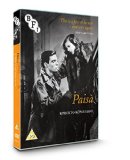 Paisà (DVD) | DVD | (30/03/2015)
from £9.15
| Saving you £10.84 (118.47%)
| RRP
Paisà (DVD) | DVD | (30/03/2015)
from £9.15
| Saving you £10.84 (118.47%)
| RRP Available the first time on DVD in the UK Roberto Rossellini’s ambitious and enormously moving follow-up to his breakthrough Rome Open City is presented here in a new restoration. Constructed as a series of encounters which take place across Italy during the advance of Allied troops through the country from Sicily to the northern Po Valley Paisà forms the second part of Rossellini’s celebrated War Trilogy and is a classic of neo-realist cinema. Features: Remastered presentation
![Francesco, Giullare Di Dio [1950]](/pictures/1011132.jpg) Francesco, Giullare Di Dio | DVD | (23/05/2005)
from £N/A
| Saving you £N/A (N/A%)
| RRP
Francesco, Giullare Di Dio | DVD | (23/05/2005)
from £N/A
| Saving you £N/A (N/A%)
| RRP Roberto Rossellini and co-writer Federico Fellini lovingly render the very spirit of Franciscan teaching in this extraordinarily fresh and simple film which was unappreciated at the time of its release but now regarded as one of his greatest. Shot in a neorealist manner with non-professional actors (including thirteen real Franciscan monks from the convent of Nocere Inferiore) it avoids the pious clichs of haloed movie saints with an economy of expression and a touching human quali
![Stromboli [Blu-ray]](/pictures/1120809.jpg) Stromboli | Blu Ray | (02/12/2013)
from £26.98
| Saving you £N/A (N/A%)
| RRP
Stromboli | Blu Ray | (02/12/2013)
from £26.98
| Saving you £N/A (N/A%)
| RRP This Dual Format Edition brings this classic of world cinema to Blu-ray for the first time in the UK. Roberto Rossellini's 1950 classic of Neo-Realism stars Ingrid Bergman as Karin, a displaced Lithuanian in Italy, who escapes an internment camp by marrying an Italian ex-soldier turned fisherman (Mario Vitale). She soon discovers that his home, the volcanic island of Stromboli, is harsh and barren, and that its traditional and conservative people treat her with hostility. Released at the height of the international scandal surrounding the director's affair with his star, this is the definitive presentation of one of the classics of Italian cinema.
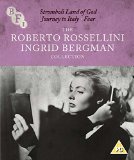 Rossellini & Bergman Collection (Limited Edition Numbered Blu-ray Box Set) | Blu Ray | (20/07/2015)
from £41.75
| Saving you £8.24 (19.74%)
| RRP
Rossellini & Bergman Collection (Limited Edition Numbered Blu-ray Box Set) | Blu Ray | (20/07/2015)
from £41.75
| Saving you £8.24 (19.74%)
| RRP In 1950 one of Italy’s most celebrated filmmakers Roberto Rossellini and one of Hollywood’s greatest screen stars Ingrid Bergman came together to make the classic Stromboli Land of God. On the production of that film they embarked not only on an extraordinary artistic collaboration but also on an affair which would send shockwaves throughout the film world. By 1954 their real-life relationship was crumbling and films such as Journey to Italy seemed to echo this change. This numbered limited edition brings together three of Rossellini and Bergman’s greatest collaborations –Stromboli Land of God Journey to Italy and Fear – in new digital restorations and presents extensive extra features including Rossellini’s rare 1952 feature film The Machine That Kills Bad People Francesco Patierno’s 2012 documentary The War of the Volcanoes and Isabella Rossellini’s and personal My Dad is 100 Years Old (2005 dir. Guy Maddin). Stromboli Land of God Italy USA | 1950 | 1.33:1 | black and white | Italian language with English subtitles | 100 mins Journey to Italy Italy France | 1954 | 1.33:1 | black and white | English language | 86 mins Fear Germany Italy | 1954 | 1.33:1 | black and white | English language | 83 mins
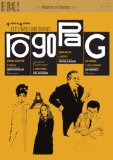 RoGoPaG (Masters of Cinema) (DVD) | DVD | (27/08/2012)
from £10.99
| Saving you £6.00 (54.60%)
| RRP
RoGoPaG (Masters of Cinema) (DVD) | DVD | (27/08/2012)
from £10.99
| Saving you £6.00 (54.60%)
| RRP Conceived by the legendary Italian producer Alfredo Bini, the multi-director portmanteau film Let's Wash Our Brains: RoGoPaG (Laviamoci il cervello: RoGoPaG) brought together four esteemed directors of European cinema to contribute comic episodes reflective of the swinging post-boom era. The resulting omnibus collectively examines social anxieties around sex, nuclear war, religion, urbanisation - and the promise of a modern cinema.Roberto Rossellini's Illibatezza (Virginity) follows an airline stewardess plagued by an obsessed American tourist whose 8mm camera enables the indulgence of a personal, and solipsistic, vision of the Ideal. Jean-Luc Godard's Il nuovo mondo (The New World) takes place in an Italian-dubbed Paris beset by nuclear fallout, and wittily chronicles the changes that take place in the lives - and medicine cabinet - of a handsome young couple. Pier Paolo Pasolini's scandalous La ricotta (Ricotta, as in the curded cheese) presents the goings-on around a film shoot devoted to the Crucifixion and presided over by none other than Orson Welles (playing a kind of stand-in for Pasolini himself); it is this episode that landed Pasolini with a suspended four-month prison sentence. Lastly, Ugo Gregoretti's Il pollo ruspante (Free-Range Chicken) depicts a middle-class Milanese family flirting with the purchase of real-estate and engaging catastrophically with an antagonistic consumerist infrastructure.
![Journey To Italy [DVD +Blu-ray]](/pictures/1122459.jpg) Journey To Italy | Blu Ray | (02/12/2013)
from £26.98
| Saving you £N/A (N/A%)
| RRP
Journey To Italy | Blu Ray | (02/12/2013)
from £26.98
| Saving you £N/A (N/A%)
| RRP Widely regarded as Roberto Rossellini's greatest achievement Journey to Italy was the culminating masterpiece of the Italian neo-realism and the film that inspired the French new wave. Voted as one of the Top 50 films ever made in the 2012 Sight and Sound Critics Poll this stunning restoration is finally released on Blu-ray for the first time as part of this Dual Format Edition. Ingrid Bergman (Notorious Stromboli) and George Sanders (All About Eve Rebecca) play Katherine and Alex Joyce an English married couple who travel to Italy to oversee the sale of a villa. Unused to each other's company the couple argue and quarrel as their differences in taste and temperament drive them to separation. Beautifully shot on location throughout Italy including the streets and museums of Naples the island of Capri and the ruins of Pompeii Journey to Italy was considered a masterpiece by many of the leading French new wave critics-turned-filmmakers. This long awaited restoration offers UK audiences a chance to rediscover a profoundly moving masterpiece. Special Features: Presented in both High Definition and Standard Definition Original Italian language version Alternative English language version Feature-length Laura Mulvey audio commentary Extensive booklet with essays and film notes
 Rossellini: The War Trilogy (Limited Edition Numbered Blu-ray Box Set) | Blu Ray | (01/04/2015)
from £N/A
| Saving you £N/A (N/A%)
| RRP
Rossellini: The War Trilogy (Limited Edition Numbered Blu-ray Box Set) | Blu Ray | (01/04/2015)
from £N/A
| Saving you £N/A (N/A%)
| RRP Available for the first time on Blu-ray in the UK these stunning films by master filmmaker Roberto Rossellini are all undisputed classics of world cinema. This limited edition Blu-ray box set includes Rossellini’s celebrated War Trilogy made during and immediately after World War II – Rome Open City Paisà and Germany Year Zero – as well as his controversial 1948 film L’Amore starring Anna Magnani and Federico Fellini. These are the films that established Roberto Rossellini’s as one of the most important and influential filmmakers of all time. All of the films in this strictly limited Blu-ray box set (of 3000 numbered units) have been restored in 4K. Features: Restored versions of Rome Open City (1945) Paisà (1948) Germany Year Zero (1948) L’Amore (1948) Booklet with film notes and complete credits Other extras TBC
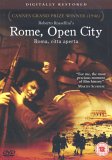 Rome, Open City | DVD | (11/04/2005)
from £N/A
| Saving you £N/A (N/A%)
| RRP
Rome, Open City | DVD | (11/04/2005)
from £N/A
| Saving you £N/A (N/A%)
| RRP 'Open City' Roberto Rossellini's startling depiction of Nazi-occupied World War II Rome and one of the most prominent examples of his neorealist cinematic style is the story of a tenaciously held underground resistance against the Germans. When its leader Manfredi (Marcello Pagliero) and a priest Don Pietro (Aldo Fabrizi) are captured the resistance collapses with disastrous personal results to all. The film was nominated for an Oscar for Best Screenplay; Fellini collaborat
![Viva L'Italia [Blu-ray]](/pictures/1146035.jpg) Viva L'Italia | Blu Ray | (29/01/2018)
from £17.98
| Saving you £N/A (N/A%)
| RRP
Viva L'Italia | Blu Ray | (29/01/2018)
from £17.98
| Saving you £N/A (N/A%)
| RRP Viva L'Italia Viva l'Italia is a documentary made after the event, trying to figure out what happened. I tried to place myself in front of the events of a century ago, the way a documentarist would have done who had the good fortune to follow Garibaldi's campaign with his camera. - Roberto Rossellini To celebrate the centenary of Italy, the Italian government commissioned Rossellini to make a biopic of Giuseppe Garibaldi, one that would follow his exploits with the Thousand' and their role in the country's unification. Rossellini approached the film as he had Francesco, giullare di Dio, presenting the main character in neo-realist mode, as though making a documentary. Restored by Arrow Films from the original negative, this disc marks the first UK home video release of Viva l'Italia in any format, allowing English-speaking audience to discover another Rossellini classic. Brand new 2K restoration from the original negative Features: High Definition Blu-ray (1080p) presentation Original Italian mono soundtracks with optional English subtitles Garibaldi, an alternate shorter cut of the film originally prepared for the US market Brand-new interview with Roberto Rossellini's assistant on the film, Ruggero Deodato, recorded exclusively for this release I Am Garibaldi , a brand-new visual essay by Tag Gallagher, author of The Adventures of Roberto Rossellini: His Life and Films Reversible sleeve with original and newly commissioned artwork by Sean Phillips FIRST PRESSING ONLY: Illustrated collector's booklet containing new writing on the film by filmmaker and critic Michael Pattison
![Rome, Open City [DVD] [1945]](/pictures/1098556.jpg) Rome, Open City | DVD | (15/03/2010)
from £9.43
| Saving you £6.56 (41.00%)
| RRP
Rome, Open City | DVD | (15/03/2010)
from £9.43
| Saving you £6.56 (41.00%)
| RRP Based on real events that took place in Nazi-occupied Italy in 1944 Rome Open City examines the choices that people are forced to make in wartime. Centering on the Resistance and its members this is a tragic and emotional exploration of human spirit and the effects of war. One of the greatest foreign language films in cinema history Roberto Rossellini's Rome Open City was filmed in the aftermath of World War II on the ravaged streets of Italy. Due to the scarcities of War scraps of film from photographers were added to hand held camerawork natural lighting and a cast of non-actors to create this frank and gritty tale of war torn Italy in a perfect example of a neo-realist film.
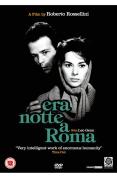 Era Notte A Roma | DVD | (18/02/2008)
from £10.35
| Saving you £7.64 (73.82%)
| RRP
Era Notte A Roma | DVD | (18/02/2008)
from £10.35
| Saving you £7.64 (73.82%)
| RRP In the tumult of Nazi-occupied Rome a sympathetic bootlegger already accustomed to living outside the law opens her home to a trio of escaped Allied prisoners of war an American a Russian and a Briton - jeopardizing her safety and that of her lover for the cause.
![RoGoPaG [Masters of Cinema] (Dual Format Edition) [Blu-ray] [1963]](/pictures/1116108.jpg) RoGoPaG | Blu Ray | (27/08/2012)
from £N/A
| Saving you £N/A (N/A%)
| RRP
RoGoPaG | Blu Ray | (27/08/2012)
from £N/A
| Saving you £N/A (N/A%)
| RRP Conceived by the legendary Italian producer Alfredo Bini, the multi-director portmanteau film Let's Wash Our Brains: RoGoPaG (Laviamoci il cervello: RoGoPaG) brought together four giants of European cinema to contribute comic episodes reflective of the swinging post-boom era. The resulting omnibus collectively examines social anxieties around sex, nuclear war, religion, urbanisation - and the promise of a modern cinema.Roberto Rossellini's Illibatezza [Virginity] follows an airline stewardess plagued by an obsessed American tourist whose 8mm camera enables the indulgence of a personal, and solipsistic, vision of the Ideal. Jean-Luc Godard's Il nuovo mondo [The New World] takes place in an Italian-dubbed Paris beset by nuclear fallout, and wittily chronicles the changes that take place in the lives - and medicine cabinet - of a handsome young couple. Pier Paolo Pasolini's scandalous La ricotta [Ricotta, as in the curded cheese] presents the goings-on around a film shoot devoted to the Crucifixion and presided over by none other than Orson Welles (playing a kind of stand-in for Pasolini himself); it is this episode that landed Pasolini with a suspended four-month prison sentence. Lastly, Ugo Gregoretti's Il pollo ruspante [Free-Range Chicken] depicts a middle-class Milanese family flirting with the purchase of real-estate and engaging catastrophically with an antagonistic consumeristinfrastructure.

Please wait. Loading...
This site uses cookies.
More details in our privacy policy